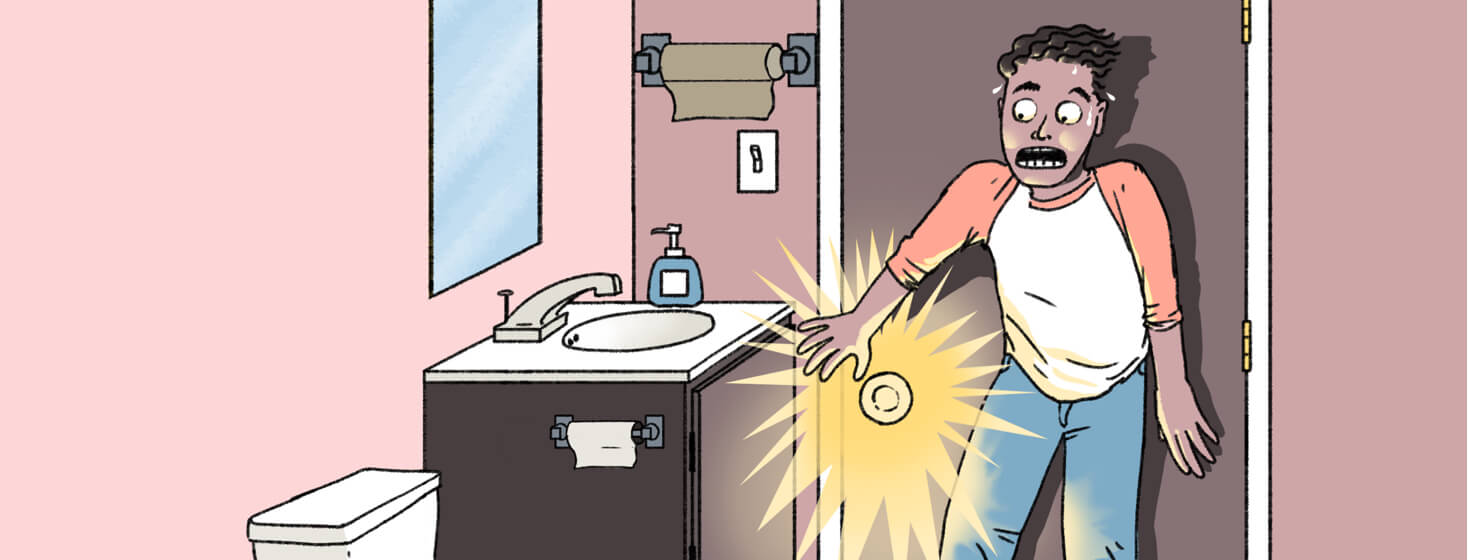Bathroom Burdens: Chronic Constipation and MS
Multiple sclerosis can cause all sorts of symptoms that in turn can create problems. One such symptom is chronic constipation. On too many occasions, evidence of this problem has surfaced in unexpected ways. Here are a few of my constipation-related stories.
I had intense abdominal pain
Several years ago, I experienced such intense abdominal pain that I called my primary care physician. Although my presentation wasn’t quite typical, she was concerned at the time that I might be experiencing an appendicitis attack. A CT scan scheduled that same day revealed instead that I was experiencing an attack of diverticulitis.
What is diverticulitis?
Diverticulitis is the infection or inflammation of small pouches that develop in weak spots in the wall of the colon. These pouches are called diverticula. Symptoms may include constipation, diarrhea, abdominal pain, or bloating. The abdominal pain was severe in my case.1
The following year when I had my first colonoscopy, the gastroenterologist noted the diverticula present in my colon. He told me that chronic constipation and straining while trying to defecate are among possible causes.
Abdominal x-ray and constipation
There was a separate period of time when I was experiencing pain while urinating but tested negative for a urinary tract infection. I was also experiencing discomfort in my back and abdomen. My MS nurse suspected kidney stones and ordered an abdominal x-ray.
Unfortunately, the x-ray did not reveal kidney stones. Instead, view of the kidneys was obstructed by a large amount of feces filling up a portion of my entire colon. Basically, the x-rays diagnosed a case of constipation that hadn’t even been my primary medical complaint. Increased water and fiber intake were the recommendations.
Public restrooms and constipation
I'm now much more aware of my tendency to be constipated and how to deal with it. But there is one occasion which stands out in my mind as being particularly horrifying. It’s the type of situation that I hope no one else has had to experience.
I was scheduled for my annual MRI scans at a local MRI center. Although the center is a decent size and has a very large waiting area, it only features one public single-toilet bathroom. There are additional bathrooms in the dressing areas, but only the one out front.
While waiting to be called back, I felt the need to go to the bathroom which was fortunately not occupied. However, things did not go as planned. I tried to defecate as normal. That didn’t work. I tried to relax and let gravity help, but it didn’t. I tried to force it, but that didn’t work either.
Trying again to get my bowels moving
Maybe I would just have to wait until later to try again, I thought, but wiping and a brief moment standing up let me know that I HAD to get things moving then and there and couldn’t wait. So I tried to relax again.
Knock, knock, at the door. Crap. “Someone’s in here,” I reply. 'If only I could crap.' I thought to myself. Everything was just stuck.
More knocking at the door didn't help
I thought that if I could get ahold of some of the solid waste, which had the consistency of sculpting clay, I might be able to pull some of it out and break up the backup. I had hopes that would work. It might have, but then there was the knocking at the door again.
I tried all the tips I had read about online about trying to stimulate the bowels to move by using my finger to circle around the inside of the sphincter. I tried leaning to one side or the other. I tried bending as far forward as I could and as far back as I could without success. I tried really hard to push, although I knew that I risked causing more diverticula to develop.
Desperately emptying my bowels manually
Getting more desperate, I tried scooping what I could, however I could. At this point, my hand was a mess since I had nothing to protect it with. So with each teaspoon to tablespoon amount of feces, I began to empty what I could. Such a sculpting clay, thick, sticky mess. I heard someone talking to the receptionist about the bathroom being locked.
Physical pain coupled with embarrassment and frustration
Eventually, I was able to remove enough feces that the rest of it slid as it should. By this time, I was crying from both the physical pain I had just experienced and the emotional embarrassment and frustration I felt. I scrubbed and scrubbed my hands as much as I could, even using paper towels to get under my fingernails and around my cuticles.
It was a horrifying experience and one that strongly reminded me just how uncooperative my bowels can be sometimes.
Steps I've taken to reduce the strain
I am much more aware of my bowel habits now. What I do doesn’t always take care of chronic constipation, but it helps. Now, I REALLY make sure that I drink enough water every day. I eat foods high in fiber, but also use fiber supplements on occasion. I take magnesium every night and will add a stool softener as needed. I’ve even added a probiotic to my regimen.
But one of the things that seems to help the most is routine exercise. If I move my abdominal muscles through cycling or other exercise, it seems to stimulate my intestines to move, too.
There have been many times that I’ve observed the excitement and energy with which my cat races out of the bathroom when he is done with his business. Now I know the excitement he must feel, because I too love that completely empty, light feeling after a complete bowel movement.
Be well, my friends,
Lisa
Read my other articles on MultipleSclerosis.net

Join the conversation